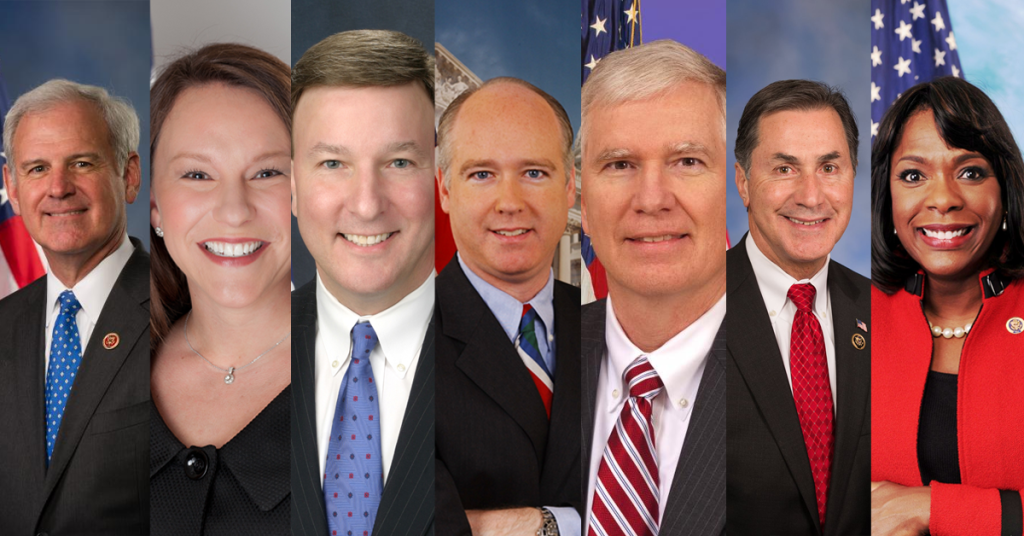Richard Shelby named a model of courage in the Senate on AFFH defund

Alabama Republican U.S. Sen. Richard Shelby received high praise Thursday by the Americans for Limited Government President Rick Manning after Shelby, along with Utah Republican U.S. Sen. Mike Lee, worked diligently to pass an amendment proposed to the Transportation and Housing and Urban Development (HUD) appropriations bill. Introduced by Sen. Lee, the amendment would prohibit implementation of the HUD regulation “Affirmatively Furthering Fair Housing” (AFFH) that conditions $3 billion of yearly community development block grants on 1,200 recipient cities and counties rezoning neighborhoods along income and racial guidelines. Despite their best efforts, the amendment was tabled by a vote of 60 to 37. “Americans wonder what is going wrong with the system in Washington, D.C., where senators seem more interested in playing paddy cake with President Obama and his radical agenda rather than standing up and fighting it,” said Manning. “Unfortunately, too many of [their] Republican colleagues were more afraid of the race hustlers who seek to put low-income high-rise apartments into middle-class neighborhoods, and the Lee amendment failed.” Manning continued, “Here is the truth. Local zoning only determines what can be built where, not who can live there. Senator Lee and Senator Shelby’s willingness to stand up for local control over our nation’s zoning laws demonstrates once again that they are some of the few who match what they say back home with what they do in Washington, D.C.” All hope is not lost for proponents of the Lee amendment. Companion language has been once again introduced in the U.S. House of Representatives by. U.S. Rep. Paul Gosar from Arizona. “The good news is that the House has passed the exact same language as offered by Lee the past two years with support ranging across the conference’s ideological divide, so there is still a chance for stopping Obama’s HUD madness,” Manning explained. “In the meantime, every citizen should find out if their city or county are one of the 1,200 local governments which take community development block grants.”
Hillary Clinton: Donald Trump is ‘not qualified’ to be president

Hillary Clinton says Donald Trump is “not qualified” to be president of the United States. During an interview on CNN Thursday, the Democratic front-runner criticized the presumptive Republican nominee, questioning his ability to handle complex foreign policy challenges and decrying his “irresponsible, reckless dangerous comments.” Clinton said she knows “how hard this job is” and added that she had “concluded he is not qualified to be president of the United States.” Looking ahead to the general election, Clinton asserted that she “will be the nominee for my party,” noting her lead in delegates and votes over Democratic opponent Bernie Sanders. On division among Democrats, she said she was committed to party unity, but argued that Sanders will have to play a role in bringing Democrats together. Republished with permission of The Associated Press.
Mike Rogers: What the NDAA means for East Alabama

As you may have seen, the House of Representatives just passed the National Defense Authorization Act (NDAA) of 2017. It is the 55th consecutive NDAA, legislation that authorizes funding for the Department of Defense and ensures that Congress fulfills its constitutional duty to make sure that our warfighters have the training and equipment that they need. In addition to setting the priorities for our national defense, this legislation also has language that could be important to folks across East Alabama. For example, an amendment was included that would help installations like the Anniston Army Depot in Calhoun County retain a skilled and knowledgeable workforce. The amendment would make it easier for the Depot to hire temporary and term employees for permanent positions as they became available. This authority will allow the Depot to be as agile and nimble as possible in their support of the Army as they confront the ever-changing security threats from ISIS to Russia. Another example of how the legislation could impact East Alabama is by forcing the Secretary of the Army to transfer its surplus vintage firearms to the Civilian Marksmanship Program (CMP). From there the CMP would take these vintage pistols and inspect, grade and prepare them for sale. If this sounds familiar, it’s because last year in the same bill we ask that the Army turn over the pistols. Unfortunately, in what has become an all too common occurrence, the Obama Administration has chosen not to follow directives that Congress passes. With the language included in this year’s House bill, the Army will have no choice but to turn over the pistols to the CMP. The NDAA also included full funding of the missile defense request of our great allies in Israel for co-development and coproduction of Iron Dome, David’s Sling and Arrow 3. This funding is even more important now with Iran developing its missile technology at an alarming rate as a result of the President’s ill-conceived deal. This legislation will help fund our brave men and women in uniform, keep our country safe from harm and will include these common sense solutions. I am pleased to have worked on this important legislation. • • • Mike Rogers is a member of U.S. Congress representing Alabama’s 3rd Congressional District.
Alabama delegation votes for $610B defense bill, despite White House objections

After two days of debate, the U.S. House of Representatives approved a $610 billion defense spending bill by a 277-147 vote late Wednesday night, setting up a summer-long negotiation with their Senate counterparts over necessary military priorities and policy. The bill, H.R. 4909: the National Defense Authorization Act, authorizes spending for military personnel, weapons systems, national security programs, as well as foreign military operations for FY 2017. Additionally, it improves access to quality care for service members, retirees, and their families, while enhancing medical readiness. These reforms make no changes for the current force or retirees. U.S. Rep. Terri Sewell was the sole Alabama House Member to vote against the bill. She joined 147 of her Democratic peers, along with just five Republicans, in voting against the measure. The remainder of the seven-member Alabama delegation — Reps. Bradley Bryne, Martha Roby, Mike Rogers, Robert Aderholt, Mo Brooks and Gary Palmer — voted in support of the bill. Among its many provisions and reforms, the NDAA includes: Military Personnel and Pay: Supports a 2.1 percent pay raise for service members, which is higher than the President’s proposal of 1.6 percent. BRAC: Prohibits another round of base closings. Strengthens Military: Reverses cuts to troop strength; increases investments in training and maintenance programs; and rebuilds crumbling facilities like barracks, hangars, and airfields. Readiness: Makes vital investments in maintenance by including an increase of $597 million for the Navy and Marine Corps, $312 million for the Army, and $430 million more for the Air Force to ensure next-to-deploy units are mission capable. Deterring Russia: Provides funds for more troops and equipment in Europe to deter Russia, as well as additional funds to assist Ukraine. Fighting ISIS: Provides funds to train and equip Syrian fighters and assist Iraqis in retaking Mosul, and adds funds to make sure that Kurdish and Sunni allies can stay in the fight. Commissaries: Reforms the commissary system to preserve the benefit, while also making improvements to ensure continued saving for shoppers, good value for taxpayers, and ongoing support for morale, welfare, and recreational activities. Reforms Uniform Code of Military Justice (UCMJ): Modernizes the Uniform Code of Military Justice to improve the system’s efficiency and transparency, while also enhancing victims’ rights and expands the statute of limitations for child abuse offenses and fraudulent enlistment. Before the vote, the White House issued a veto threat over the bill on Monday due to a number of provisions. A primary White House complaint is that the House bill leaves U.S. war-fighting obligations underfunded, setting the stage for the need of a potential midyear supplemental appropriation. “By gambling with war-fighting funds, the bill risks the safety of our men and women fighting to keep America safe, undercuts stable planning and efficient use of taxpayer dollars, dispirits troops and their families, baffles our allies, and emboldens our enemies,” the White House said in a statement. Meanwhile, House Republicans say the spending plan is critical to ensure the military has the resources it needs, as it wages wars in Afghanistan and against Islamic State militants in Iraq and Syria. Here’s what delegation members are saying about their votes: U.S. Rep. Bradley Byrne (AL-01): It seems like every day a new report comes out about the dire situation our military is in. That’s why it is so important this year’s NDAA makes critical investments in boosting military readiness to ensure we can respond to the wide range of threats facing our country. The bill also makes long-needed reforms to ensure efficiency and accountability at the Pentagon. U.S. Rep. Martha Roby (AL-02): No comment available at this time. U.S. Rep. Mike Rogers (AL-03): This is the 55th consecutive NDAA, legislation that authorizes funding for the Department of Defense and ensures that Congress fulfills its constitutional duty to make sure that our warfighters have the training and equipment that they need. In addition to setting the priorities for our national defense, this legislation also has language that could be important to folks across East Alabama. Rep. Robert Aderholt (AL-04): No comment available at this time. Rep. Mo Brooks (AL-05): In recent years, America’s national security capabilities have been hampered and hollowed out by the unwillingness of Congress and the President to properly fund America’s military. The FY17 NDAA takes a step toward restoring vital funding, modernizing equipment, and providing our warfighters with the personnel and weaponry needed to protect America. In addition, the FY17 NDAA improves accountability by reforming acquisition laws and enhancing cyber security. Rep. Gary Palmer (AL-06): No comment available at this time. Rep. Terri Sewell (AL-07): As a Member of Congress, I am fully committed to ensuring that our brave men and women in uniform have all of the support necessary to protect and defend our great nation from threats both foreign and domestic. My vote on the NDAA in no way undermines that unyielding commitment to preserving our national security, and ensuring our military has the resources that it needs to meet ongoing and emerging threats around the world. However, I am deeply concerned that this bill would set a dangerous precedent by promoting uncertainty for our military at a time when it desperately needs reliable support. … Ultimately, we must put partisan politics aside and pass a defense authorization bill to maintain the safety and security of all Americans. Since President Obama has already indicated his intention to veto this bill, I look forward to working with my colleagues on both sides of the aisle to pass a national defense authorization bill which appropriately funds all necessary government services and military obligations.
Congress reaches deal to overhaul chemical regulation

A bipartisan agreement reached by House and Senate negotiators would set safety standards for tens of thousands of chemicals that have gone unregulated for decades. The bill would offer new protections for pregnant women, children, workers and others vulnerable to the effects of chemicals such as formaldehyde and styrene used in homes and businesses every day. The bill also would tighten restrictions on asbestos and other deadly chemicals. The agreement announced Thursday merges bills that the House and Senate passed last year. If enacted into law, it would be the first significant update to the Toxic Substances Control Act since the law was adopted in 1976. The bill, more than three years in the making, has won the backing of both industry officials and some of the Capitol’s most liberal lawmakers, including Sens. Barbara Boxer of California and Edward Markey, D-Mass. The bill also has the support of conservative Republicans such as Sens. David Vitter of Louisiana and James Inhofe of Oklahoma. “This is a political Halley’s comet” that may not be seen again for many years, Markey, a former opponent of the bill who signed onto it in recent weeks after changes were made to ensure states that regulate chemicals closely can continue to do so. Markey called the bill “a special piece of legislation” that finally updates one of the major environmental laws approved during the 1970s. The compromise bill is supported by groups ranging from the U.S. Chamber of Commerce to major environmental organizations and the Humane Society of the United States. The chamber said in a statement that the measure “goes a long way to providing businesses with much-needed clarity and certainty by facilitating a more predictable federal regulatory program” for chemical regulation. Richard Denison, a senior scientist for the Environmental Defense Fund, called the bill a “significant victory for public health,” noting that it will require safety reviews for chemicals already in use and mandate greater scrutiny of new chemicals before they can be sold. “While not perfect, this will be a dramatic improvement over current law,” Denison said. Chemicals used in everyday products such as household cleaners, clothing and furniture have been linked to serious illnesses, including cancer, infertility, diabetes and Parkinson’s disease. Under current law, only a small fraction of chemicals used in these products have been reviewed for safety. Chemical regulation took on new urgency after a 2014 spill in West Virginia contaminated drinking water in that state. Republished with permission of The Associated Press.


